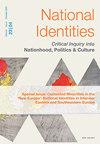公民-种族二元对立的持续:西欧、中欧和东欧国家与文明的相互竞争的愿景
IF 0.7
Q3 POLITICAL SCIENCE
引用次数: 3
摘要
“好的进步的”和“坏的倒退的”民族主义的规范性二元,可追溯到公民和种族的二分法,在今天的民族主义和民粹主义的研究中仍然存在。本文首先通过考察西方关于公民国家的三种立场来强调这种方法的不足,每种立场都拒绝种族民族主义,并反映了不同的基本关切。再往东看,中欧的二元对立被颠倒了,与“自由的世界主义者”背道而驰;在俄罗斯,克里姆林宫的“国家文明”计划可以被视为当代非西方大国国家建设的一种独特趋势。本文章由计算机程序翻译,如有差异,请以英文原文为准。
The persistence of the civic–ethnic binary: competing visions of the nation and civilization in western, Central and Eastern Europe
ABSTRACT The normative binary of ‘good-progressive’ and ‘bad-retrograde’ nationalism, traceable to the civic and ethnic dichotomy, is alive and well in studies of nationalism and populism today. This article underlines the insufficiency of this approach, firstly by examining three stances on the civic nation in the West, each of which rejects ethnic nationalism and reflect different fundamental concerns. Moving east, in Central Europe the binary is inverted and turned against ‘liberal cosmopolitans’; in Russia, the Kremlin’s ‘state-civilization’ project can be viewed as a distinct trend in nation-building for non-Western contemporary great powers.
求助全文
通过发布文献求助,成功后即可免费获取论文全文。
去求助
来源期刊

NATIONAL IDENTITIES
POLITICAL SCIENCE-
CiteScore
1.70
自引率
0.00%
发文量
37
期刊介绍:
National Identities explores the formation and expression of national identity from antiquity to the present day. It examines the role in forging identity of cultural (language, architecture, music, gender, religion, the media, sport, encounters with "the other" etc.) and political (state forms, wars, boundaries) factors, by examining how these have been shaped and changed over time. The historical significance of "nation"in political and cultural terms is considered in relationship to other important and in some cases countervailing forms of identity such as religion, region, tribe or class. The focus is on identity, rather than on contingent political forms that may express it. The journal is not prescriptive or proscriptive in its approach.
 求助内容:
求助内容: 应助结果提醒方式:
应助结果提醒方式:


